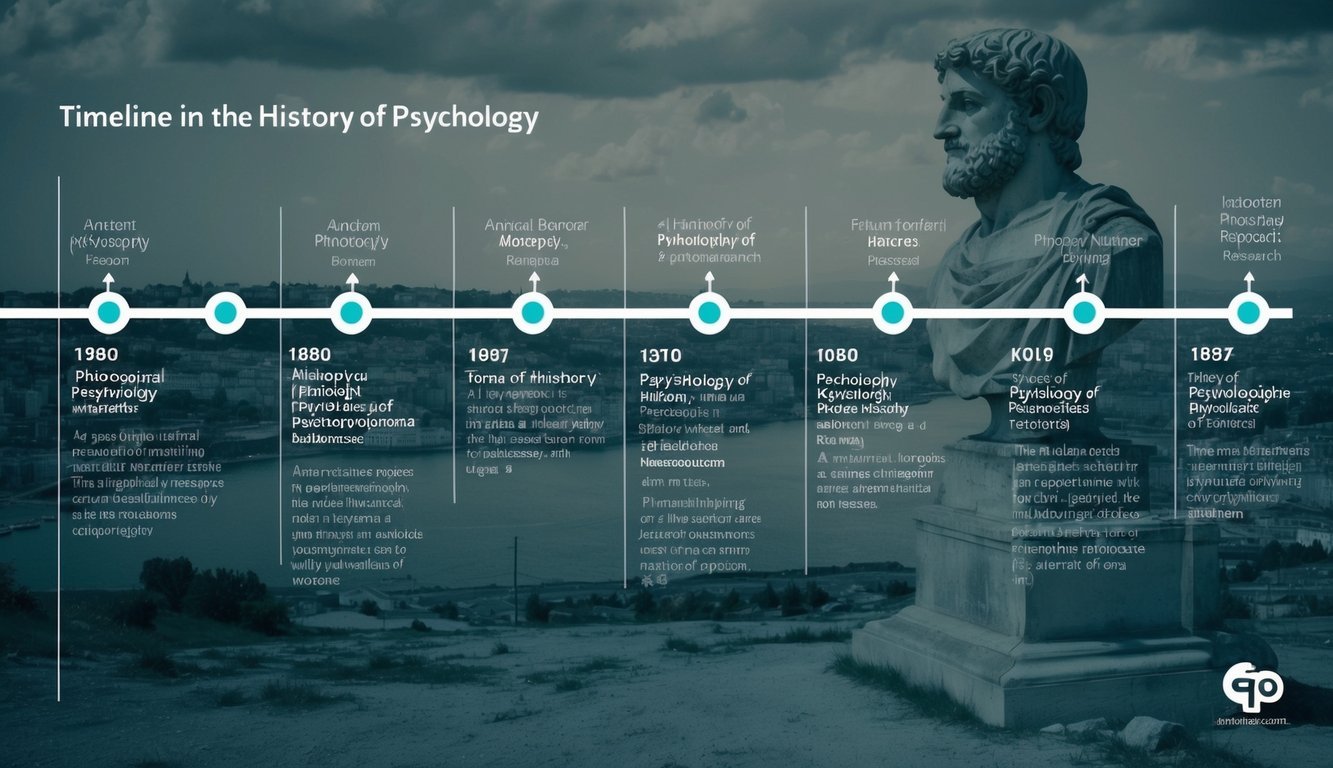PsychNewsDaily Publishers
100 Summit Drive
Burlington, MA, 01803
Telephone: (320) 349-2484
PsychNewsDaily Publishers
100 Summit Drive
Burlington, MA, 01803
Telephone: (320) 349-2484
Psychology originated from ancient philosophical ideas, evolving through scientific inquiry and major schools of thought, including psychoanalysis, behaviorism, humanistic psychology, and cognitive psychology.

The roots of psychology can be traced back to ancient philosophical ideas, evolving through rigorous scientific exploration. Influential figures and critical developments helped form psychology as a structured scientific discipline.
Early thinkers from Egypt and Greece established a vital foundation for the study of psychology. The Ancient Egyptians were among the pioneers in examining the mind and behavior, influencing later Greek philosophers.
Plato introduced the concept of a tripartite soul, comprising reason, spirit, and appetite. This idea informed subsequent theories on personality in psychology.
On the other hand, Aristotle emphasized the importance of empirical observation and categorization. His research on memory, perception, and dreams significantly contributed to psychology’s emergence as a science.
The 17th and 18th centuries marked a shift toward systematic observation and experimentation. Scholars began employing scientific methods to explore the complexities of the mind.
René Descartes introduced the idea of mind-body dualism, which ignited ongoing debates that persist in contemporary psychology.
John Locke’s proposition of the mind as a “blank slate” influenced ideas about learning and development.
The 19th century witnessed progress in fields such as physiology and neurology, setting the stage for psychology to establish itself scientifically.
In 1879, Wilhelm Wundt founded the first experimental psychology laboratory in Leipzig, Germany. This event signified the formal recognition of psychology as an independent scientific field.
Wundt introduced the method of introspection for studying conscious experiences, where trained individuals conveyed their thoughts and sensations in carefully controlled settings.
His research formed the basis for structuralism, one of the early schools of psychology dedicated to analyzing the fundamental elements of consciousness.
The laboratory that Wundt established trained numerous influential psychologists, contributing to the global dissemination of scientific psychology.

Psychology has progressed through various schools of thought, each offering unique perspectives on human behavior and mental processes. These significant approaches have shaped the discipline’s evolution and continue to influence contemporary psychological practice and research.
Psychoanalysis, initiated by Sigmund Freud, highlights the influence of unconscious forces on behavior and personality. Freud theorized that the human mind is composed of three components: the id, the ego, and the superego.
The id embodies basic instincts, the superego represents moral standards, and the ego balances the two. Freud posited that early experiences significantly shape adult conduct.
Psychoanalytic methods, such as free association and dream interpretation, aim to bring repressed thoughts to light and resolve internal struggles. Though controversial, Freud’s theories have had a profound and lasting effect on psychology and broader culture.
Behaviorism, spearheaded by John B. Watson and further developed by B.F. Skinner, concentrates on observable behaviors rather than internal mental processes. This school of thought asserts that all behaviors are learned through environmental interactions.
Watson’s notable “Little Albert” experiment showcased how fear can be conditioned. Skinner introduced the concept of operant conditioning, illustrating how behaviors can be reinforced or punished.
Behaviorists championed the use of scientific methodologies within psychology, leading to pragmatic applications in education, therapy, and organizational practices.
Humanistic psychology arose in response to psychoanalysis and behaviorism, stressing the importance of individual potential, self-actualization, and personal development.
Prominent figures such as Abraham Maslow, who formulated the hierarchy of needs, and Carl Rogers, who developed client-centered therapy, emphasized the intrinsic goodness of humans and their capacity for positive choices.
Humanistic psychologists prioritize:
Their techniques often focus on cultivating self-awareness and facilitating personal growth.
Cognitive psychology investigates internal mental processes, including problem-solving, memory, and decision-making. This perspective likens the mind to an information processor, akin to a computer.
Researchers in this domain focus on how individuals:
Cognitive psychology has substantially influenced fields like artificial intelligence, neuroscience, and education, leading to practical applications that enhance memory, improve learning techniques, and assist in treating cognitive disorders.

Psychological practices have progressed significantly over the years, evolving with scientific advancements and societal demands. These shifts have shaped the approaches to mental health, assessment techniques, and therapeutic methods.
Clinical psychology emerged as a distinct field in the late 19th century, focusing on diagnosing and treating mental disorders. This led to the establishment of specialized psychology clinics that served both research and practical applications of psychological theories.
Initially, clinical psychologists primarily operated in institutional settings, addressing severe mental health issues. As understanding evolved, the scope broadened to cover milder psychological challenges and preventive care.
The introduction of standardized diagnostic criteria, such as the Diagnostic and Statistical Manual of Mental Disorders (DSM), revolutionized clinical practices, allowing for consistent diagnosis and treatment across the discipline.
Psychiatry and psychotherapy have profoundly shaped the development of psychological practices. The amalgamation of medical and psychological approaches has resulted in more comprehensive treatment models.
Freud’s psychoanalytic theories generated interest in talk therapy, paving the way for numerous psychotherapeutic methods, including cognitive therapy and behavioral interventions.
The collaboration between psychiatry and psychology has enhanced the understanding of the biological components of mental disorders, informing both pharmacological and psychological treatment options.
Psychological assessment methods have transitioned from basic observations to intricate, standardized instruments. Early assessments were centered around intelligence testing, utilizing tools like the Stanford-Binet Intelligence Scales.
The advent of personality evaluations, including the Rorschach inkblot test and the Minnesota Multiphasic Personality Inventory (MMPI), broadened the range of psychological assessment.
Modern assessment methods now incorporate neuropsychological testing, behavioral observations, and self-report tools, offering a comprehensive view of an individual’s cognitive, emotional, and behavioral functioning.
Advancements in technology have resulted in computerized testing and data analysis, enhancing both the effectiveness and precision of psychological assessments.

Psychological research and experimentation have been crucial for enhancing our understanding of human behavior, cognition, and mental processes. These scientific methodologies have yielded significant breakthroughs in studying and interpreting the human mind.
Psychology has undergone considerable advancements in its research methods over the years. Experimental psychology has risen as a key approach for studying both human behavior and mental processes.
Researchers developed meticulous experimental designs to isolate variables and establish cause-and-effect relationships. These methodologies included randomized controlled trials, double-blind studies, and longitudinal research.
Statistical techniques advanced, enabling the analysis of complex data sets and facilitating more sophisticated interpretations of findings. Signal detection theory became a vital tool for understanding sensory experiences and decision-making.
Behavioral research concentrated on observable actions and responses to stimuli. Scientists examined learning and memory through conditioning techniques and reinforcement experiments.
With the rise of cognitive psychology, the focus shifted to internal mental processes. Researchers devised innovative methods to probe perception, attention, and problem-solving.
Experimental psychologists employed technologies like eye-tracking and reaction time measurements to gain deeper insights into cognitive processes. Such advancements have fostered a better understanding of how humans process information and make decisions.
Biological psychology merged neuroscience with psychological studies, probing the links between brain structures and behaviors and discovering the neural mechanisms behind various psychological phenomena.
Brain imaging technologies such as fMRI and EEG transformed the field by enabling researchers to visualize brain activity as it occurs. These innovations offered unprecedented insights into sensory processing, emotional responses, and cognitive functions.
Investigations into genetics and neurotransmitter functions have further clarified the biological foundations of behavior and mental processes. This interdisciplinary approach significantly deepened our understanding of psychological disorders and their potential treatments.
Psychological theories have experienced considerable evolution, influenced by a variety of factors and ongoing research. These transformations mirror our growing comprehension of human behavior and cognition.
The debate surrounding nature versus nurture has long impacted psychological theories. Twin studies have shed light on the interplay of genetic and environmental elements in shaping behavior.
Behavioral theories, including classical and operant conditioning, underscored environmental impacts on behavior. B.F. Skinner’s insights on reinforcement fundamentally changed our understanding of the learning process.
Research into genetics has uncovered hereditary aspects influencing various psychological traits and conditions. This knowledge has spurred the development of more nuanced theories that incorporate both genetic predispositions and environmental influences.
Modern psychology embraces a variety of theoretical frameworks. Cognitive science has emerged as a dominant paradigm, concentrating on mental processes and how information is processed.
Humanistic psychology, advanced by Abraham Maslow and Carl Rogers, places emphasis on self-actualization and personal development. Maslow’s hierarchy of needs continues to be pivotal in understanding human motivation.
The realm of social psychology investigates how social interactions impact behavior and cognition, significantly enhancing our grasp of group dynamics and interpersonal relationships.
Positive psychology, a relatively recent discipline, concentrates on wellbeing and human strengths, diverging from a strict focus on pathology.
Psychology has grown increasingly relevant across various sectors of society. Its theoretical frameworks play a crucial role in education, healthcare, business, and public policy.
In clinical environments, evidence-based treatments derived from psychological theories assist in addressing mental health disorders. Cognitive-behavioral therapy, based on cognitive and behavioral principles, is a prominent example.
Evolutionary psychological theories provide insights into human behavior through an adaptive lens, influencing areas such as marketing and product design.
Cognitive science is spearheading transformative changes in psychology. Neuroimaging technologies, such as fMRI and EEG, afford unparalleled insights into brain activity. These tools facilitate the mapping of neural connections and enable real-time studies of cognitive processes.
Machine learning algorithms are enhancing the analysis of behavioral data, revealing patterns that were previously unnoticed. This collaboration between psychology and artificial intelligence opens new pathways for understanding complex cognitive phenomena.
Techniques aimed at cognitive enhancement, including transcranial magnetic stimulation, are gaining recognition for their potential in treating cognitive disorders and optimizing mental performance.
The American Psychological Association promotes these advances by fostering collaboration between cognitive scientists and psychologists.
Virtual and augmented reality are reshaping psychological research and therapeutic practices by creating immersive environments for studying behavior and assisting with conditions like phobias or PTSD.
Wearable technology and smartphones facilitate continuous monitoring of psychological states, enhancing the study of mood disorders and stress responses.
AI-driven chatbots are emerging as supplementary mental health support tools, offering preliminary assistance without replacing human therapists.
Telemedicine has broadened access to psychological services, particularly in remote regions, reshaping the delivery and reception of therapy.
Contemporary psychology increasingly acknowledges the significance of cultural diversity. Research efforts are expanding beyond Western-centric frameworks to embrace broader perspectives.
Cross-cultural investigations elucidate how cultural backgrounds influence cognition, emotion, and behavior. This global perspective is essential for developing more inclusive psychological theories.
Growing international collaborations are enriching the exchange of ideas and methodologies, enhancing the field’s capability to tackle global mental health issues.
Psychology is playing a crucial role in addressing societal challenges, such as climate change anxiety and the psychological effects of social media, demonstrating the field’s adaptability to current issues.
“`